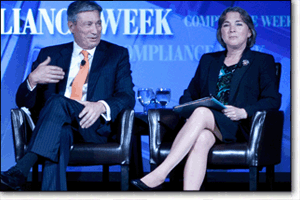Close menu
- Home
-
News
- Back to parent navigation item
- News
- National Compliance Officer Day 2025
- Accounting & Auditing
- AI
- AML
- Anti-Bribery
- Best Practices
- Boards & Shareholders
- Cryptocurrency and Digital Assets
- Culture
- ESG/Social Responsibility
- Ethics & Culture
- Europe
- Financial Services
- Internal Controls
- Regulatory Enforcement
- Regulatory Policy
- Risk Management
- Sanctions
- Surveys & Benchmarking
- Supply Chain
- Third Party Risk
- Whistleblowers
- Opinion
- Benchmarking
- Certification
- Events
- Research
- Awards
-
CW Connect
- Back to parent navigation item
- CW Connect
- Sign In
- Apply
- Membership
- Contact
Mandatory Auditor Rotation Debate Still Not Settled
By Tammy Whitehouse2012-10-30T00:00:00
THIS IS MEMBERS-ONLY CONTENT
You are not logged in and do not have access to members-only content.
If you are already a registered user or a member, SIGN IN now.
Related articles
-
 Article
ArticleFew Ideas, Fewer Solutions on Increasing Audit Objectivity
2013-10-29T00:00:00Z By Tammy Whitehouse
-

-
 Article
ArticleFrench investigators target anticompetitive practices in largest accounting firms
2026-02-05T00:55:00Z By Ruth Prickett
Major accountancy firms in France are under investigation for anti-competitive practices. The French competition watchdog embarked on a series of “unannounced inspections” and removed documents relating to audit and reporting on Jan. 13.
- Terms and Conditions
- Privacy Policy
- Do Not Sell My Info
- © 2025 Compliance Week
Site powered by Webvision Cloud






